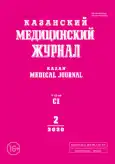Лазерные технологии в ведении больных с осложнёнными формами инфекций, передаваемых половым путём
- Авторы: Мисбахова А.Г.1, Абдрахманов А.Р.1,2, Беляев А.Р.3
-
Учреждения:
- Казанский государственный медицинский университет
- Казанский (Приволжский) федеральный университет
- Медико-санитарная часть Казанского (Приволжского) федерального университета
- Выпуск: Том 101, № 2 (2020)
- Страницы: 289-295
- Тип: Обмен клиническим опытом
- URL: https://journal-vniispk.ru/kazanmedj/article/view/26277
- DOI: https://doi.org/10.17816/KMJ2020-289
- ID: 26277
Цитировать
Полный текст
Аннотация
Цель. Изучить и оценить клиническую эффективность медицинских лазерных технологий в комплексном лечении осложнённых форм инфекций, передаваемых половым путём.
Методы. Для этиологической диагностики возбудителей применяли современные технологии молекулярно-биологической лабораторной диагностики в режиме реального времени c амплификатором Real-time CFX96 Bio-Rad Laboratorias (USA). Определение инфекционно-воспалительных поражений тканей органов половой системы осуществляли с помощью ультразвукового исследования на аппарате ALOKA CCL-680 (Япония) с применением полостных датчиков с рабочей частотой 5 МГц. Лекарственную терапию проводили в соответствии с Федеральными клиническими рекомендациями Российского общества дерматовенерологов и косметологов «Дерматовенерология» (Москва, 2015). Для оценки эффективности лазерных технологий в комплексном лечении пациенты с осложнёнными формами инфекций, передаваемых половым путём, случайным образом были разделены на две группы — контрольную (32 пациента), где применяли только традиционную терапию, и основную (108 пациентов), в которой, кроме традиционной терапии, лечение дополняли методикой лазерной терапии.
Результаты. Эффективность антибактериальной терапии в основной группе оказалась на 14,0%, а лечения с использованием лазерных технологий — на 33,1% выше эффективности лечения в контрольной группе. Это показывает эффективность применения лазерных технологий при лечении инфекционно-воспалительных структурных изменений тканей органов репродуктивной системы.
Вывод. Применение медицинских лазерных технологий в лечении осложнённых форм с изменением параметров воздействия в зависимости от выявленных воспалительно-структурных изменений тканей поражённых органов показало высокую эффективность (79,6%); данную технологию можно рекомендовать к применению в практическом здравоохранении для лечения осложнённых форм инфекций, передаваемых половым путём.
Полный текст
Открыть статью на сайте журналаОб авторах
Альбина Гарифовна Мисбахова
Казанский государственный медицинский университет
Email: dr.abdrakhmanov.azat@yandex.ru
Россия, г. Казань, Россия
Азат Расимович Абдрахманов
Казанский государственный медицинский университет; Казанский (Приволжский) федеральный университет
Автор, ответственный за переписку.
Email: dr.abdrakhmanov.azat@yandex.ru
SPIN-код: 1813-6452
Россия, г. Казань, Россия; г. Казань, Россия
Айрат Раисович Беляев
Медико-санитарная часть Казанского (Приволжского) федерального университета
Email: dr.abdrakhmanov.azat@yandex.ru
Россия, г. Казань, Россия
Список литературы
- Кубанова А.А., Мелехина П.Е., Кубанов А.А. Основные задачи развития дерматовенерологической помощи населению Российской Федерации на период до 2024 года. Результаты деятельности медицинских организаций по оказанию дерматовенерологической помощи населению Российской Федерации в 2017 году. Вестн. дерматол. и венерол. 2018; 94 (5): 9–25. doi: 10.25208/0042-4609-2018-94-5-9-25.
- Летяева О.И., Гизингер О.А. Нерешённые вопросы терапии воспалительных заболеваний женских половых органов в репродуктивном возрасте. Вопр. гинекол., акушерства и перинатол. 2012; (6): 12–18.
- Кузьмин В.Н. Современные подходы в лечении воспалительных заболеваний органов малого таза у женщин. Consil. med. 2009; 11 (6): 21–23.
- Краснопольский В.И., Серова О.Ф., Туманова В.А. и др. Влияние инфекций на репродуктивную систему женщин. Рос. вестн. акушерства и гинекол. 2004; (5): 26–29.
- Рюмин Д.В., Савельева Е.М. Особенности иммунного статуса у больных смешанными урогенитальными инфекциями и возможности его коррекции. Практич. мед. 2013; (1–4): 42–45.
- Перламутров Ю.Н., Чернова Н.И. Возможности совершенствования терапии урогенитальной бактериально-вирусной инфекции. Клин. дерматол. и венерол. 2016; 15 (1): 28–33. doi: 10.17116/klinderma201615128-33.
- Абдрахманов Р.М., Петрова А.С., Абдрахманов А.Р. Клинико-лабораторная оценка роли условно-патогенной флоры, передаваемой половым путём, в формировании патологических состояний шейки матки и цервикального канала у женщин репродуктивного возраста. Соврем. пробл. науки и образования. 2018; (1): 72. http://www.science-education.ru/ru/article/view?id=27413 (дата обращения: 27.11.2019).
- Фёдорова В.А., Султанахмедов Э.С., Салтыков Ю.В. и др. Совершенствование лабораторной диагностики урогенитальной хламидийной инфекции у пациентов с нарушением репродуктивной системы, инфицированных Chlamydia trachomatis. Вестн. дерматол. и венерол. 2017; (2): 34–44. doi: 10.25208/0042-4609-2017-93-2-34-44.
- Прилепская В.Н. Воспалительные заболевания органов малого таза. М: ГЭОТАР-Медиа. 2010; 128 с.
- Прилепская В.Н. Инфекции, передающиеся половым путём. Клинические лекции. Под ред. В.Н. Прилепской. М.: ГЭОТАР-Медиа. 2014; 160 с.
- Materials of XVIII FIGO Congress of Gynecology and Obstetrics. Kuala Lumpur Malaysia. 5–10 Nov. 2006; 45 р.
- Федеральные клинические рекомендации. Дерматовенерология 2015. Болезни кожи. Инфекции, передаваемые половым путём. 5-е изд., перераб. и доп. М.: Деловой экспресс. 2016; 768 с.
- Хейфец Ю.Б. Методические рекомендации по применению аппарата квантовой терапии «МИЛТА». М.: ЗАО «МИЛТА-ПКП ГИТ». 2014; 275 с.
Дополнительные файлы






